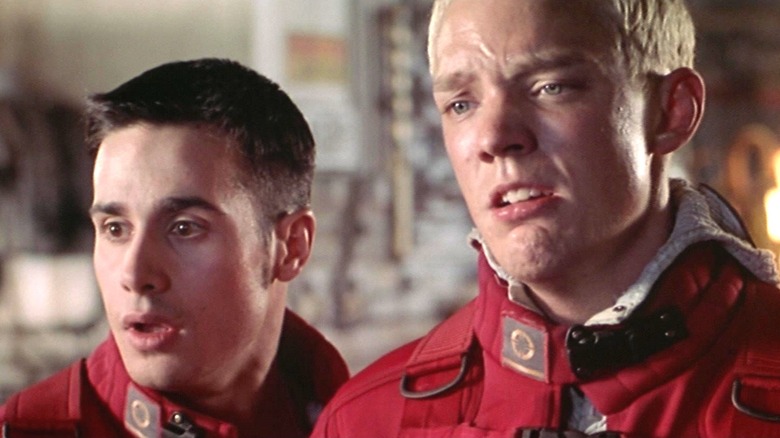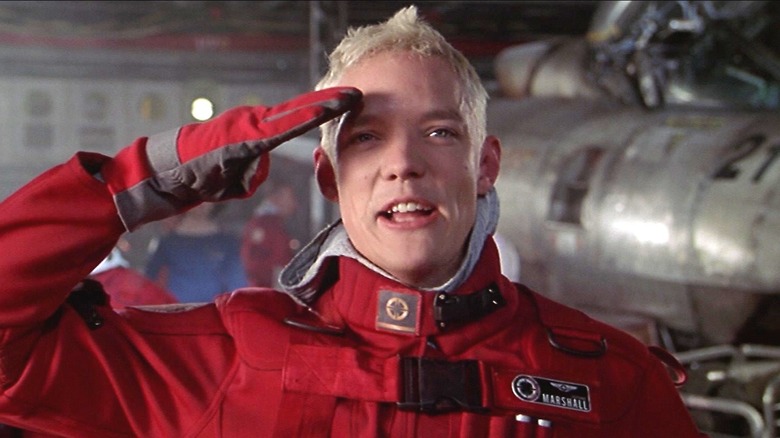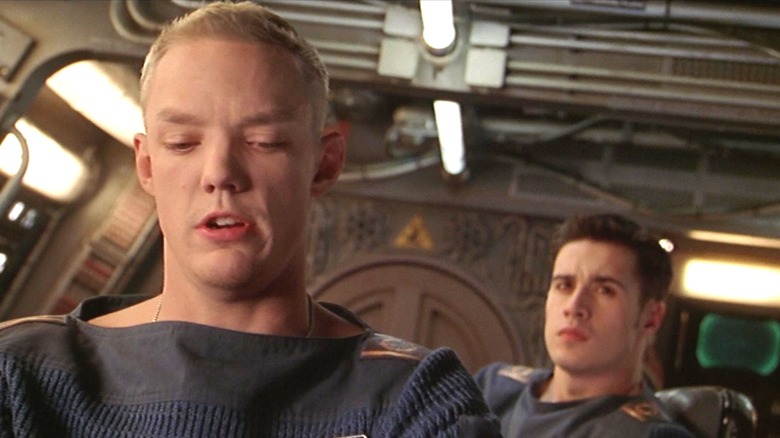Before Scooby-Doo, Matthew Lillard & Freddie Prinze Jr. Starred In A Forgotten Sci-Fi War Movie
A generation of kids grew up watching Raja Gosnell's 2002 live-action comedy flick "Scooby-Doo," an adaptation of Hanna-Barbera's long-running Scooby-Doo cartoon shows from the 1970s. In the film, Freddy, originally voiced by Frank Welker, was played by Freddie Prinze, Jr., and Shaggy, originally voiced by Casey Kasem, was played by Matthew Lillard. Prinze was squarely in the public eye after starring in hit films like "She's All That" and "I Know What You Did Last Summer," while Lillard was famous for his turns in "Hackers," "Scream," and "SLC Punk!" Lillard, incidentally, was also in "She's All That." Both actors were very much their generation's "It" boys, and the decade proved to be very lucrative for them both.
Well, "Wing Commander" notwithstanding.
"Wing Commander" is not well-remembered by too many people. It was based on a series of 1990s "Wing Commander" video games created by Chris Roberts, who also directed the film. The games were set in the 27th century, when a war had broken out between Earth and a warlike species of space cats called the Kilrathi. Players controlled ships commanded by the Terran Confederation in a space travel simulator setup. The games were notable for their extensive use of live-action cutscenes, usually starring recognizable Hollywood and British actors like Mark Hamill, John Rhys-Davies, John Hurt, Malcom McDowell, Christopher Walken, and Thomas Wilson.
The cutscenes were tantalizing to the game franchise's fans, and invited questions of whether a movie could be made from them. Roberts attempted to make that movie in 1999, casting Prinze and Lillard, as well as Saffron Burrows, David Warner, and Jürgen Prochnow as the Wing Commanders.
The film is forgettable and awful, and it bombed at the box office.
Wing Commander was an early example of video game movies not working
The story of the "Wing Commander" movie, like the games, involves the Earth/Kilrathi War. The Kilrathi finally found a map revealing the location of Earth, and they intend to attack. It's up to the Wing Commanders — the Confederation's young fighter pilots — to defend the Earth from attack. Prinze's character, Lieutenant "Maverick" Blair, is the child of the first generation of Earth's space explorers, giving him a special talent for spatial navigation. Despite this, he is sneered at by his commanding officers. Blair's best friend is Lieutenant "Maniac" Marshall (Lillard), and they will get into several scrapes, both with each other and the Kilrathi.
The film's plotting is predictable, and the dialogue is rote. What might have been impressive on a video game screen in the 1990s wasn't as impressive in theaters. The special effects were clunky, with Roberts using a few sequences that incorporated then-fashionable bullet-time techniques. Bullet-time would catch world audience's attention in "The Matrix" only a couple of weeks later, so "Wing Commander" kind of beat it to the punch. The one positive thing that can be said about "Wing Commander" is that its overture by David Arnold ("Stargate") is amazing. (Seriously, it's of "Star Wars" quality.)
No one liked the movie, and it was quickly held up as another example of how adapting video games to the big screen wasn't working at the time. Despite "Wing Commander" being primed for a movie adaptation considering the games already having those cinematic cutscenes, the film made only $11 million on a modest $25 million budget.
Wing Commander was panned by critics
Critics panned "Wing Commander" relentlessly. It has a very low 10% approval rating on Rotten Tomatoes, based on 51 reviews. Owen Gleiberman, writing for EW, gave it an "F." Roger Ebert gave it only one star, citing its clichés and its silly sci-fi conceits (and Ebert usually liked sci-fi movies). Wesley Morris, writing for the San Francisco Examiner, noted that "Wing Commander" looked cheap as well, saying that the space uniforms looked like off-the-rack items one might find at an Urban Outfitters.
Films adapted from video games struggled for many years. In the '80s and '90s, video games weren't terribly sophisticated in their storytelling, usually borrowing their plots from fantasy films, action hooey, and sci-fi schlock. During this period, films like Paul W.S. Anderson's "Mortal Kombat" were considered the high-water marks in the genre, and that should tell you everything you need to know about where we were in 1995.
Eventually, as video games evolved, they became far more sophisticated than movies in terms of length and ambitious story conceits. By the mid-2000s, films had to catch up to games, reducing complex game lore into a traditional filmic three-act structure. It wouldn't be until "The Super Mario Bros. Movie" and "Sonic the Hedgehog" in the 2020s that video game movies would become undeniable hits and well-reviewed-enough by critics.
"Wing Commander," meanwhile, came during the painful 1990s transition when video game movies were still seen as generally unfavorable. The failure of "Wing Commander" indicated that the genre was a poor investment. It's unlikely that Prinze or Lillard highlight it on their resumes.


